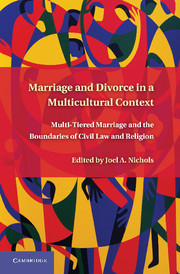 Marriage and Divorce in a Multi-Cultural Context
Marriage and Divorce in a Multi-Cultural Context Book contents
- Frontmatter
- Contents
- Detail Contents
- About the Editor
- List of Contributors
- Preface
- Permissions
- Introduction
- 1 Multi-Tiered Marriage
- 2 Pluralism and Decentralization in Marriage Regulation
- 3 Marriage and the Law
- 4 Unofficial Family Law
- 5 Covenant Marriage Laws
- 6 New York’s Regulation of Jewish Marriage
- 7 Political Liberalism, Islamic Family Law, and Family Law Pluralism
- 8 Multi-Tiered Marriages in South Africa
- 9 Ancient and Modern Boundary Crossings Between Personal Laws and Civil Law in Composite India
- 10 The Perils of Privatized Marriage
- 11 Canadian Conjugal Mosaic
- 12 Marriage Pluralism in the United States
- 13 Faith in Law? Diffusing Tensions Between Diversity and Equality
- 14 The Frontiers of Marital Pluralism
- Index
- References
2 - Pluralism and Decentralization in Marriage Regulation
Published online by Cambridge University Press: 05 November 2011
- Frontmatter
- Contents
- Detail Contents
- About the Editor
- List of Contributors
- Preface
- Permissions
- Introduction
- 1 Multi-Tiered Marriage
- 2 Pluralism and Decentralization in Marriage Regulation
- 3 Marriage and the Law
- 4 Unofficial Family Law
- 5 Covenant Marriage Laws
- 6 New York’s Regulation of Jewish Marriage
- 7 Political Liberalism, Islamic Family Law, and Family Law Pluralism
- 8 Multi-Tiered Marriages in South Africa
- 9 Ancient and Modern Boundary Crossings Between Personal Laws and Civil Law in Composite India
- 10 The Perils of Privatized Marriage
- 11 Canadian Conjugal Mosaic
- 12 Marriage Pluralism in the United States
- 13 Faith in Law? Diffusing Tensions Between Diversity and Equality
- 14 The Frontiers of Marital Pluralism
- Index
- References
Summary
This chapter explores the role of the state in regulating marriage in the United States and what that role should be, given the growing set of alternative marriage options and the increasing decentralization of marriage regulation. “State role” here is understood both broadly, as the governmental role at any level, and more specifically, as the relative roles of the federal and state governments within the U.S. federal system.
This exploration will reflect both the general sense that governments will inevitably face a growing diversity and decentralization of marriage options and the view (expressed, for example, in Joel Nichols’s article, in some of my own work, and elsewhere) that greater diversity and decentralization could be a good idea. To some extent, I will consider a level of pluralism and decentralization that may not come about (and may be unlikely ever to come about) to examine the potential attractions (and repulsions) of that alternative world. However, the fact remains that current family law doctrine, rules of federalism, and conflict-of-laws principles collectively hobble the ability of states to effectuate policies in this area. The overall consequence is a certain level of de facto pluralism and decentralization, and one might reasonably explore whether increasing that pluralism and decentralization would do more good than harm.
- Type
- Chapter
- Information
- Marriage and Divorce in a Multi-Cultural ContextMulti-Tiered Marriage and the Boundaries of Civil Law and Religion, pp. 60 - 77Publisher: Cambridge University PressPrint publication year: 2011
